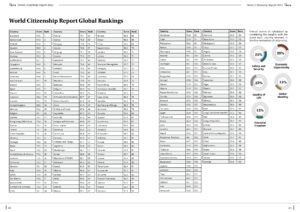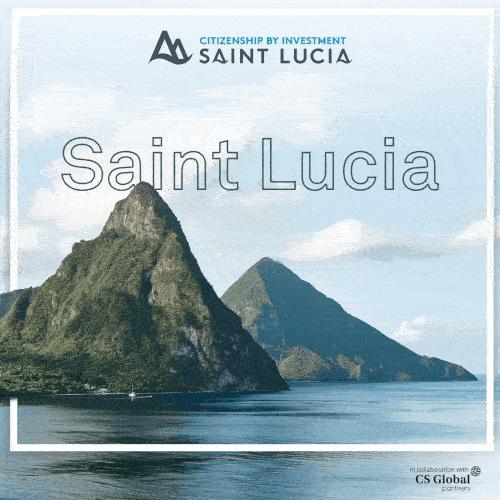CS Global Partners, a prominent government advisory and marketing firm from London, has published the World Citizenship Report (WCR) 2023 on April 20, 2023. In the World Citizenship Report, they evaluated almost 188 countries and identified the top five nations as Denmark, Switzerland, Finland, Sweden, and New Zealand. While Switzerland held the top position in 2022, Denmark surpassed it to become the number one country in the 2023 ranking.
As per the report, the Republic of Korea experienced the biggest drop, in 2022 it ranked at number 28, falling 20 spots to number 48 in 2023.
Last year in 2022, the WCR focused on high-net-worth individuals (HNWIs), which they surveyed. It included a wider audience to gain a better perspective of what people prioritise in terms of their own nationality.
The World Citizenship Report delivers a data-intensive product that highlights the importance of nationality, and it also helps demystify the standing of each country in the world in the context of the motivators that determine what an individual considers important in life to thrive. This holistic approach concentrates on the factors that global citizens consider when deciding where to live, work, educate themselves and their families, and place down secondary roots.
According to the CEO of CS Global Partners, Micha Rose Emmett, in the 2022 edition of the WCR, tehy surveyed high-net-worth individuals (HNWIs); this year, they expanded the survey to include a wider audience in order to gain a better perspective of what people prioritise in terms of their own nationality. The newly expanded audience covered 1000 affluent mass participants from across the globe.

She asserted that findings from the survey showed that while the research participants came from varied backgrounds and cultures, all with different needs and pain points, they all had one common goal: freedom.
Explaining the concept of freedom, Micha Emmett added,”What that freedom means for each person is different and depends on their personal circumstances. Someone living in a country that restricts their rights, self-expression or religious freedoms may seek the freedom of expression and the freedom from discrimination. A person living in a nation with limited basic services may covet the freedom to access better healthcare, education, and social welfare programmes. Individuals experiencing limited economic opportunities face barriers to employment or business opportunities and have an increased interest in financial freedom.”
In the WCR, the CEO of CS Global Partners also welcomed contributions from knowledgeable experts Andrew Skipper, who is a founder of Polymetis Professional Solutions and Alan Newton, which is a London-based tech COO of virtual.
CEO Emmett also discussed the concept of freedom in Maslow’s Hierarchy of Needs, and noted, “Individuals may feel that they do not have access to basic necessities like food, water, shelter, or healthcare in their home country. They may also feel unsafe or experience violence, discrimination, or persecution that prevents them from feeling secure. In some cases, individuals may feel a lack of belonging or connection to their community or may face limitations in their opportunities for education or employment, which can hinder their ability to satisfy their esteem or self-actualisation needs. Regardless of the level of Maslow’s Hierarchy, a person’s state of nationality may directly affect the level on which they exist.”
The World Citizenship Report highlights the strengths and weaknesses of each country through the assessment of five key motivators. The unique methodology of the WCR is a product of comprehensive qualitative and quantitative research to evaluate 188 nationalities across all the motivators of citizenship according to their value to an affluent mass population across the globe.
The five motivators are as follows:
Safety and Security: There is no doubt that safety and security play an important role in every human life.
After getting citizenship in a renowned country, people get a chance to enjoy greater social safety and security for themselves and family.
As per Safety and Security rank poll, Iceland is the one that offers the best safety and security as per compare to the other countries. Iceland secured 1st rank with 95.8 scores, and Ireland secured the last position with 89.5 scores.
Economic Opportunity: The motivator focuses on economic opportunities provided to the citizens and residents by the host country. Economic Opportunity also refers to the ability to access the world’s greatest business hubs, and it increases access to better employment prospects and business opportunities.
As per the Economic Opportunity rank poll, Singapore is the one that secured the first position with 84.8 scores, and Liechtenstein, Monaco and San Marino are the three countries that came last and secured the same position with 79.3 scores.
Quality of Life: The report asserted that every individual first goes for Quality of life and wants to spend the rest of their life in a good and qualitative way. Higher standards of education and healthcare are the first things every individual expects from a country.

As per the ranking, Monaco is the one that offers the best Quality of life to people, while Somalia scored 35.8 points, ranking last in the chart.
Global Mobility: The global mobility motivator ranked the nation with their preferences of freedom of travel, lifestyle, business, or leisure activities. In the Global Mobility rank poll, the first spot was secured by Japan with 88.9 scores, while Hungary and Poland remained in the last sport with least score of 85.7.
Financial freedom: Financial Freedom defines the opportunity to make life decisions without overly thinking about finances. WCR stated that Denmark secured the first position with 84.0 scores, and Germany got the last position with 77.6 scores.

Furthermore, the report stated “CS Global Partners are looking to expand their prospects and take full advantage of global opportunities. CS Global Partners’ approach is to understand the needs of the clients and create tailored solutions that not only address their pain points but also create a path to a better global future.”
CS Global Partners made their approach when they saw fear as infection rates rose, hospital beds filled up, medical supplies dwindled, and doctors and nurses dropped from exhaustion. Many had to cope with living with severe restrictions.
The report also mentioned the period of COVID-19 and added that it was one of the few globally shared experiences affecting every country and the citizens who live in them.
World Citizenship report noted that countries really showed their ability, or inability, to handle the pandemic. It also showed how much governments can overreach into their citizens’ daily lives. While very few countries took a more relaxed view of the crisis, many countries took a hard stance. Surprisingly, nations that pride themselves in personal freedoms showed their worst sides. Restrictions in the UK, US, and Canada all had a significant impact on daily life, with many individuals and families experiencing hardship and disruption.

Whereas countries like France, Italy, Singapore, Saudi Arabia, and the United Arab Emirates implemented mandatory vaccinations for healthcare workers and, in some cases, private and public sector workers and teachers.
It’s worth noting that mandatory vaccination policies and vaccine passport programmes are controversial and have sparked debate in many countries. The decision to implement such policies is often based on public health concerns and the need to limit the spread of the virus, but it can also raise ethical and legal issues related to personal choice and individual freedoms.
During the pandemic, the mass affluent and high-net-worth individuals (HNWIs) have begun to look for alternative destinations as a bolt-hole for future crises, countries that offer the freedom that is lacking in their home nations.
As the pandemic wanes, the concept of citizenship has moved away from this very singular identity that means you have to be patriotic to one country. “It is comforting to identify with your own nation, but if we are going to make beneficial changes to the world, we need to start thinking as a global collective. The golden thread that unites each member of the global citizenship club together is freedom,” the report read.
While mentioning the Caribbean countries, the WCR added that they offer citizenship by investment (CBI) are successful in order to maintain their positions in the top 30 percent in 2023 which also can contribute to the economic, political, and societal stability.

Countries like Dominica, St Kitts and Nevis, and Saint Lucia all offer some of the world’s best second citizenship programmes and are serious trailblazers in the investment immigration industry, said CEO Micha Rose Emmett.




